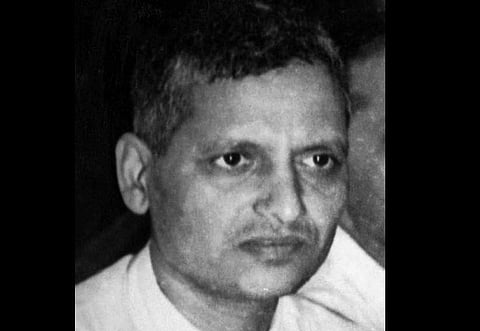

One man’s murderer is another man’s martyr. When the conflict of fundamental ideas breaches the tolerance limit of social acceptance, old phantoms are resurrected and haunt the present. In the dark burlesque of past election rhetoric, one such dubious ghost was Nathuram Godse. Two neophyte political attention seekers, Kamal Haasan and Sadhvi Pragya, exhumed Mahatma Gandhi’s assassin for not just vote fishing but also to take a short cut to political legitimacy.
In the act of pumping three bullets into Gandhi’s body, Godse had no plans to be a martyr; at his trial he said, “I thought to myself and foresaw I shall be totally ruined, and the only thing I could expect from the people would be nothing but hatred and that I shall have lost all my honour, even more valuable than my life, if I were to kill Gandhiji”.
Godse’s fury was not spur-of-the moment nationalism but a product of a turbulent time—the freedom struggle, the “ruthless surgery” by the British to create Pakistan and its formation, Partition riots and Gandhi’s moral dictatorship. Tragedies of epic magnitude like the Mahatma’s assassination cannot be interpreted in antipodal terms, and there is more to Godse than just Hindu vengeance. A Marathi Brahmin, he took part in anti-caste demonstrations and participated in multi-caste feasts. Armed with versatile curiosity he studied Dadabhai Naoroji, Swami Vivekananda, Gopal Krishna Gokhale, Bal Gangadhar Tilak, the history of ancient India, England, France, America, Russia, Socialism and Marxism.
Godse’s first act of religious defiance was to actively protest against the Nizam of Hyderabad—where the Razakar militia had been slaughtering and raping Hindus—which landed him in jail as a political prisoner. Once out, he started a newspaper and covered the Partition. He was traumatised by the terrible plight of Hindu refugees, and the communal violence of the 1940s. Godse’s speech in court is a cant of betrayal; he wept recalling his admiration for Gandhi and what he saw as the Mahatma’s subsequent betrayal of Hindus by asking for equal treatment for Muslims.
He ranted against the dissemblance in Gandhi’s stipulation for breaking his fast unto death only if the attacks on Delhi mosques were halted while keeping silent on similar violence against Hindus in Pakistan. Ironically, the persecution of Hindus was Jawaharlal Nehru’s excuse to send the Indian Army to annex Hyderabad state in September 1948.
Today’s wannabe politicians such as Haasan and Pragya do not comprehend the complexities of the age that made Godse a killer. He is certainly not a martyr. But he is not just an evil assassin either. Leave him be in the crypt of conflicted national memory where he faces judgment every day. Politics did not kill Gandhi. Belief did.